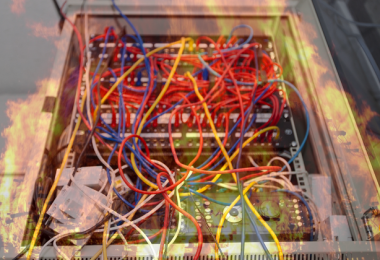If you’re planning on purchasing security cameras, then you need to learn the various types of systems that you may need. That’s why knowing the differences between NVR and DVR systems is essential, especially when purchasing security cameras.
Hence, in this comprehensive guide, we’ll be going through the list of merits & demerits of DVR and NVR home security cameras, so that you can make a well-informed purchase decision.
What Are NVR And DVR Security Cameras For?
DVR stands for Digital Video Recorder while NVR stands for Network Video Recorder. The differences between DVR and NVR all end as to how they record video. In the case of DVRs, video is taken directly from the camera via coaxial cables and then the video is further processed for recording. On the other hand, NVRs don’t process any video and simply stores the video that’s provided by the security camera.
As NVRs and DVRs handle their data differently, they also tend to work via different security cameras. For instance, DVRs work with HD security cameras over coaxial cables, while NVRs work with IP or network cameras where Ethernet cabling will be utilized. IP cameras can also be connected as wireless security cameras over WIFI to a wireless NVR.
All About DVR
Merits
- Based on analogue signal transmission over coaxial cables.
- The set-up procedure is less complex and the troubleshooting process also takes less time.
- Easier and affordable to maintain over time.
Demerits
- 4K video recording is only capped at 7-15 FPS.
All About NVR
Merits
- Uses CAT5e or CAT6 cables for transmission of data.
- Can support up to resolutions of 8MP and 12MP.
- 4K video recording at 30 FPS is available.
- Offers video analytics.
- Supports cross-talk via cameras.
Demerits
- NVR systems can be very complex to troubleshoot.
Which One Should You Go For?
Before we dive into the recommendations, you must remember that both NVR and DVR systems are great for creating a reliable security camera network.
In case you want your security cameras to record video at higher resolutions such as 4K with good frame rates like 30 FPS, then you should settle for NVR. However, if you don’t care about recording resolutions and just need a reliable, cost-effective, and simple security camera system, then you need to opt for DVR.
Furthermore, your decision will also change based on the type of security camera you already have. If you already have an existing security camera system that works on DVR, then you don’t need to make the switch to NVR and vice-versa.
Ultimately, it all comes down to your preferences and your requirements. We hope that our compact guide has been able to provide a clear understanding of NVR & DVR security cameras.







